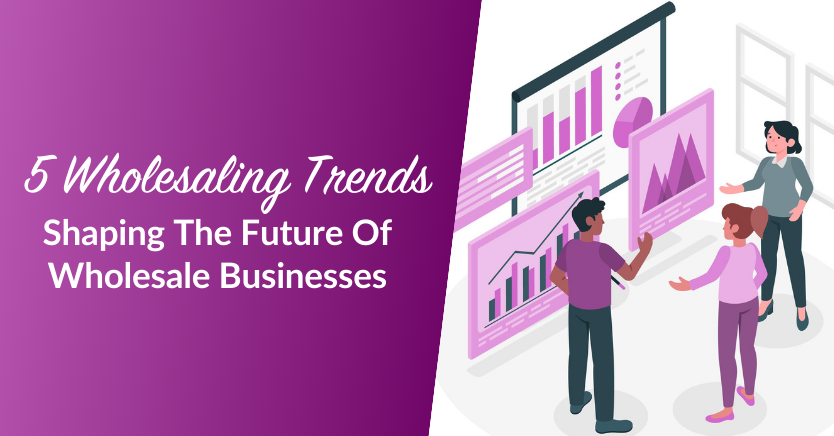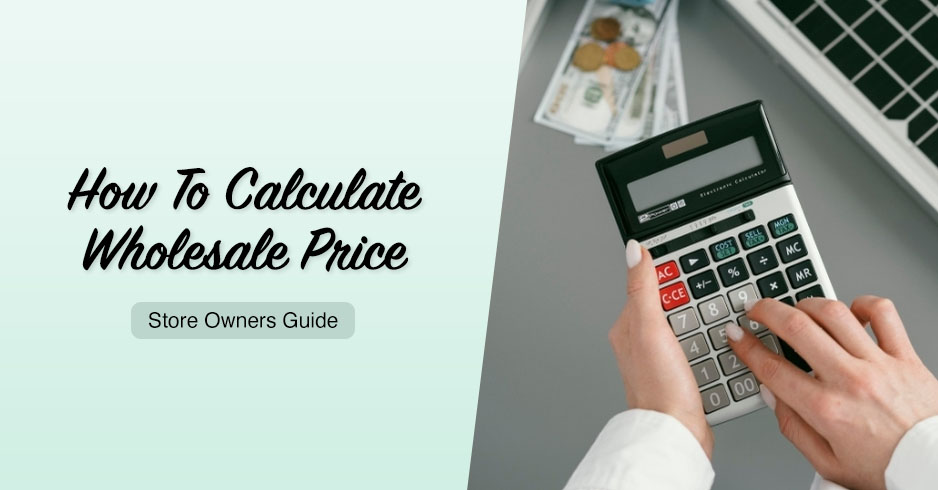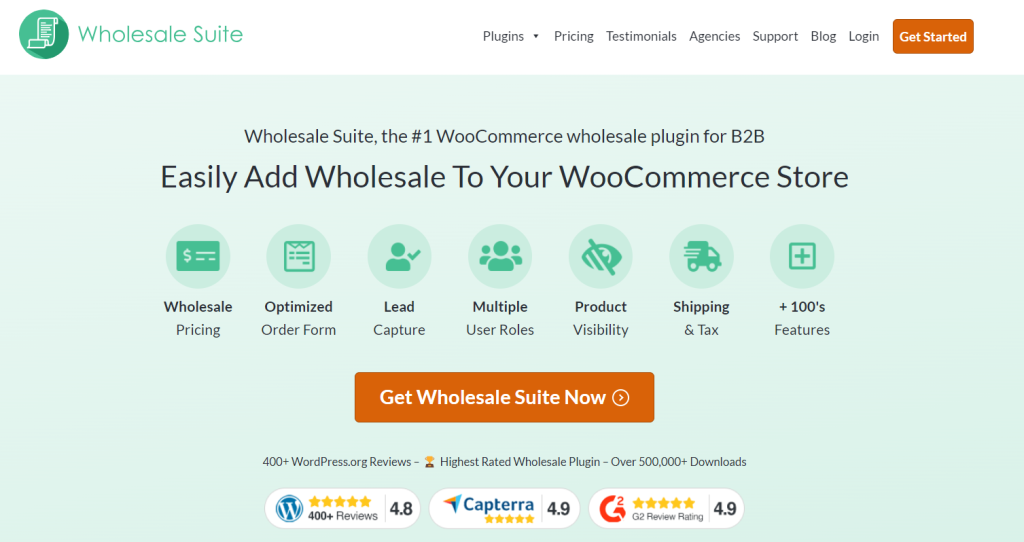
The wholesale landscape is rapidly evolving, driven by new technologies, evolving supply chain dynamics, and the changing needs of consumers. In this competitive landscape, staying ahead of the curve is a must. As a wholesaler, it’s important to be aware of the wholesaling trends shaping the future of the industry and adapt accordingly.
Yet, with all the different trends emerging, it can be difficult to identify which warrants your attention and resources. This is why we’ve made it easier for you. In this article, we’ve compiled a list of the most impactful wholesaling trends you should know.
So, let’s get started!
5 Key Wholesaling Trends Reshaping The Industry
Adaptability is the key to thriving in today’s dynamic marketplace. Modern wholesaling trends encompass several aspects, from technological innovations to shifts in consumer preferences and demands. In this section, we’ll explore each trend and offer insights to help you navigate these changes.
1. Wholesale e-commerce
The growth of B2B e-commerce was accelerated by the COVID-19 pandemic, and the industry is moving away from traditional sales models. According to Gartner’s industry prediction, 80% of B2B sales will occur in digital channels by 2025.
While the growth of e-commerce is impacting all industries, it’s especially important for wholesalers. Compared to B2C customers, B2B clients have different shopping needs. For instance, they tend to order in bulk and require specialized pricing and unique payment terms.
So, to stay competitive, you’ll have to embrace wholesale e-commerce. The first step is to establish a wholesale e-commerce platform that effectively showcases your product line and caters to the specific needs of your wholesale clients. Here are some key aspects to consider:
- Hassle-free Onboarding: Provide a simple onboarding process for new wholesale clients. You can leverage a user-friendly registration and approval system to significantly reduce the time it takes for clients to start ordering.
- Streamlined Bulk Ordering: Wholesale e-commerce platforms should have a streamlined ordering process for customers who purchase large quantities.
- Customized Pricing: You’ll also have to ensure your B2B clients get access to pricing tailored to their needs, such as special discounts based on purchase quantities or commitment levels.
- Product Information: Wholesale customers also need in-depth product information to make informed decisions. Your e-commerce platform should offer ample space to display detailed product specifications, high-quality images, and comprehensive descriptions.
Fortunately, implementing these requirements on your e-commerce website is a breeze by using today’s tools and technologies. Among these is Wholesale Suite, the all-in-one solution for WooCommerce wholesale store owners looking to address the unique needs of their B2B clients on their digital storefront.
Wholesale Suite
Wholesale Suite features three powerful plugins to turn your e-commerce website into a wholesale powerhouse. Here’s a quick glimpse of what you can do with Wholesale Suite:
- With Wholesale Prices Premium, you can effortlessly manage wholesale prices and apply tiered pricing, exclusive discounts, and personalized rates for your B2B clients.
- Wholesale Order Form equips your e-commerce store with a user-friendly and intuitive ordering form where B2B customers can easily navigate, search, and place bulk orders.
- Wholesale Lead Capture automates registration and approval processes, reducing wait times and granting wholesale customers swift access to their accounts.
Integrating solutions like Wholesale Suite into your e-commerce platform ensures that your business is well-equipped to cater to the needs of your modern B2B buyers.
2. Demand for tailored customer experiences
One of the most impactful wholesaling trends is the growing demand for personalized B2B experiences. According to industry insights, 80% of today’s B2B buyers expect the same buying experience as B2C customers. Modern B2B buyers no longer settle for one-size-fits-all solutions. Instead, they actively seek suppliers who understand their needs and requirements.
To meet this rising demand for personalization, wholesale businesses must go beyond generic interactions. This entails segmenting your customer base so you can target specific groups effectively. For example, you can segment your customers based on their industry and purchase history to craft customized pricing models or tailor your communications.

Another way to enhance customer experiences is by providing your B2B clients with a higher level of service that surpasses your competitors. For example, you can differentiate your business by offering exceptional 24/7 customer support. Additionally, you can create customized deals and promotions based on your client’s purchase history, demonstrating your commitment to their success.
Offering personalized solutions will not only help you stay ahead of wholesaling trends. It can also help you build stronger customer relationships and foster loyalty. In turn, this can translate to increased sales and repeat business.
3. Data-driven decision-making
Access to data and the ability to analyze it to make smarter decisions is one of the key wholesaling trends reshaping the industry. Today’s wholesalers have abundant information they can leverage, from sales figures to industry insights and customer data.
One area where data-driven decision-making can significantly impact your business is inventory management. By leveraging AI and machine learning tools, you can analyze historical demand patterns to predict future demand and optimize inventory levels. This not only minimizes financial waste but also ensures you satisfy your customers, minimizing delays in product availability.
Likewise, you can track purchase data to understand customer behavior. For instance, you can analyze purchase data to know which of your offerings sell well to specific customer segments. In turn, you can craft pricing strategies or marketing campaigns to cater to their preferences.
Fortunately, you won’t need to invest a considerable amount of capital to leverage the power of data analytics. Many tools and technologies, such as ERP systems and cloud-based analytics platforms, are available at reasonable costs.
4. Sustainability
Consumers and businesses alike are becoming increasingly conscious of the environmental impact of their purchases. According to an industry report, 63% of B2B buyers aim to improve sustainability in their purchasing practices. Furthermore, the same report reveals that over two-thirds of B2B buyers are required by their organizations to source from companies prioritizing sustainability.
With this growing emphasis on sustainability, wholesalers are under increasing pressure to adopt eco-friendly practices and demonstrate commitment to environmental responsibility.

There are several ways that you can adopt sustainable practices into your operations. For instance, you can opt for eco-friendly, recyclable, or biodegradable packaging materials. You can also work on adopting more energy-efficient practices in your operations, such as upgrading to LED lighting or switching to renewable energy sources if possible.
Likewise, you can explore greener transportation options to reduce your carbon footprint. This can mean optimizing your logistics to minimize fuel consumption or even opting for electric vehicles for deliveries.
Pro Tip: Want to make a real impact? Build An Eco-Friendly Marketplace and implement sustainability at every stage of your business model.
5. Supply chain optimization
The number of supply chain disruptions globally is rising, driven by unexpected events like the COVID-19 pandemic and factors such as inflationary pressure and geopolitical tensions. According to an industry report, businesses lose $182 million annually due to supply chain disruptions. These disruptions underscore the importance of supply chain resilience for wholesalers, making it one of the key wholesaling trends to embrace.
While supply chain optimization encompasses many things, it revolves around fine-tuning every aspect of the supply chain to enhance overall efficiency and performance. Here are some actionable steps for wholesalers:
- Implement Technologies for Real-Time Visibility: Such tools include IoT sensors and RFID tags to track inventory, shipments, and production progress. Real-time data empowers quick decision-making.
- Collaborate with Suppliers: Nurture your relationships with key suppliers to ensure a steady supply of products and materials. You can also consider expanding your supplier network to mitigate the risks of having only one supplier.
- Optimize Transportation: Consider alternative transportation options, such as rail or sea, to reduce dependence on a single mode of transportation and minimize shipping costs.
- Use Data to Optimize Inventory: Assess the product life cycle of your offerings and historical demand to adjust your inventory management practices. In turn, this can help you minimize inventory costs and reduce the risk of markdowns.
- Proactive Risk Mitigation: Be prepared to face potential disruptions by crafting a detailed risk management and contingency that includes the steps your business will take in case of unexpected disruptions.
Adopting these measures can help your business enhance resilience and reduce costs to help you stay ahead of the evolving wholesale landscape.
Conclusion
Adapting is critical to thriving in today’s marketplace. As we’ve discovered in this article, the wholesale landscape is evolving rapidly, driven by disruptive technologies, changes in customer behavior, and more. We’ve highlighted wholesaling trends that every forward-thinking wholesaler should have on their radar.
Let’s recap them below:
- Wholesale e-commerce
- Customer demand for personalized experience
- Data-driven decision-making
- Sustainability
- Optimizing the supply chain for resilience
These trends present both opportunities and challenges for wholesalers. By implementing the strategies we’ve discussed in this guide, you can take proactive steps to ensure your business continues to thrive.
Moreover, incorporating powerful plugins like Wholesale Suite into your arsenal of tools can help you stay ahead. Wholesale Suite is tailored for wholesalers like you, allowing you to manage wholesale prices seamlessly, streamline the shopping experience for your B2B clients, and provide them with a seamless registration process.
Do you have any questions or insights about today’s wholesaling trends? Feel free to leave us a comment below!





